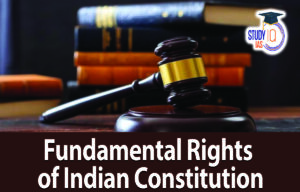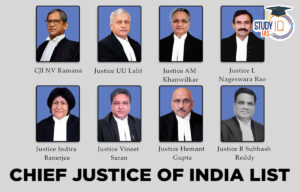Table of Contents
The Supreme Court has questioned Tamil Nadu state government’s move to issue frequent preventive detention orders under the Tamil Nadu Goondas Act.
What is Preventive Detention?
- When a person is detained/taken into custody without any trial & conviction by a court.
- It is only a precautionary measure and is based on suspicion.
Purpose
- Not to punish a person for a past offence but to prevent him from committing an offence in the near future.
- To protect state’s security & maintain Public Order.
Rights available to a Detainee under Article 22
- Period of detention: No Preventive detention law shall authorise detention for more than 3 months.
- To detain an individual beyond the period of three months authorisation is needed by an Advisory Board.
- Advisory Board Consists of a judge of a high court, among other members.
- Rights of detenu:
- The grounds of detention should be communicated to the detenu.
- Exception: Facts considered to be against the public interest need not be disclosed.
- He should be afforded an opportunity to make representation against the detention order.
- The grounds of detention should be communicated to the detenu.
| Who has the power to make laws related to Preventive Detention? |
|
| Did You Know? |
|
Preventive Detention Laws in India
Preventive Detention laws in India refer to the provisions of Indian law that allow for the detention of individuals without trial, in order to prevent them from committing an act that would pose a threat to public order or national security. In India, preventive detention laws are governed by various acts. These laws give the government broad powers to detain individuals deemed to be a threat to national security or public order for a specified period of time, without the need for trial or charge.
The provisions regarding preventive detention in India are governed by Article 22. Persons who are detained or arrested are protected by this article. Therefore, Article 22 does not apply before the arrest or imprisonment of a person or group of people; it only does so later. It should be observed that Articles 21 and 22 work well together in this situation.
A person can be put in custody for two reasons. One is if an individual has committed a crime. Second when an individual has the potential to commit a crime in the future. The custody arising out of the latter is preventive detention under which, an individual is deemed likely to commit a crime. Laws made by the government on it are,
- Preventive Detention Act, 1950. Expired in 1969.
- Maintenance of Internal Security Act (MISA), 1971. Repealed in 1978.
- National Security Act (NASA), 1980.
- Terrorist and Disruptive Activities (Prevention) Act (TADA), 1985. Repealed in 1995.
- Prevention of Terrorism Act (POTA), 2002. Repealed in 2004.
- Unlawful Activities (Prevention) Act (UAPA), 1967, as amended in 2004, 2008, 2012 and 2019. etc
Article 22 of Indian Constitution
| Article/Clause | Details |
| Article 22 | This article provides for the protection of the life and personal liberty of individuals and lays down the procedure for preventive detention. According to this article, no person can be detained without being informed of the grounds for such detention, and no person can be detained for more than three months without a judicial review. |
| Article 22(2) | This clause requires the state to provide for a judicial review of the detention within a period of five weeks from the date of detention unless the individual is otherwise released earlier. |
| Article 22(3) | This clause allows for the detention of individuals without a trial in certain circumstances, such as when a state of emergency has been declared. |
| Article 22(4) | This clause provides that any person who is detained under preventive detention laws has the right to be represented by a legal practitioner of their choice, and has the right to be informed of the grounds for their detention. |
| Article 22(5) | This clause requires the government to keep a record of all detentions and to place this record before both houses of Parliament. |
Types of Detention
Punitive Detention: This type of imprisonment is used to punish a person for an offence they committed after being found guilty in court. It occurs under any ordinary law.
Preventive Detention: It is to hold someone in custody without a court trial and conviction. Its goal is to deter someone from committing an offence in the near future rather than to punish them for a prior offence. As a result, it is purely based on suspicion and is merely a precaution.
| Protection under Punitive Detention | Protection under Preventive Detention |
Article 22 (1) gives the following rights to an individual who is arrested or detained under an ordinary law:
|
Article 22 second part ensures protection for an individual who has been arrested or detained under a preventive detention law. The protection has been ensured to both citizens as well as aliens and includes the following:
Article 22 also authorises the Parliament to prescribe
|
Preventive Detention Act 1950
- It was enacted to strengthen human detention in instances involving state conditions, such as national defence, the maintenance of peace and public order, and foreign affairs.
- The Act was challenged in the court of law in the matter of AK Gopalan versus The State of Madras, where it was cleared by the court that an individual’s freedom did not qualify as ensured under Article 21.
- A narrow view has been adopted by the Supreme Court of Articles 21 and 22, which refused to consider whether there were any flaws in the legal method.
- The Supreme Court in the Maneka Gandhi case significantly widened and interpreted the term “personal liberty” to its widest degree.
- The higher court held that Article 21 does not preclude Article 19 and that any legislation depriving a citizen of personal liberty must pass the scrutiny of both Articles 21 and 19.
| Supreme Court Judgments on Preventive Detention |
|
Preventive Detention UPSC
The laws governing preventative detention need to be revised or modified in order to comply with the Right to Life and Liberty since they are not totally fair and reasonable. Some detractors compare a security to the fundamental tenant of human rights. India is a large nation with extensive borders and a variety of identities, and as a result, the neighbouring nations are hostile to it. These security-related laws, rules, and practices have the responsibility of protecting India’s sovereignty, independence, and dignity under these circumstances.
| Other Important Articles | |
| Article 19 of Indian Constitution | Article 16 of Indian Constitution |
| Article 15 of Indian Constitution | Article 14 of Indian Constitution |


 Fundamental Rights of Indian Constitutio...
Fundamental Rights of Indian Constitutio...
 Waqf Act (Amendment) 2025: Key Highlight...
Waqf Act (Amendment) 2025: Key Highlight...
 Justice BR Gavai will take oath as 52nd ...
Justice BR Gavai will take oath as 52nd ...






















